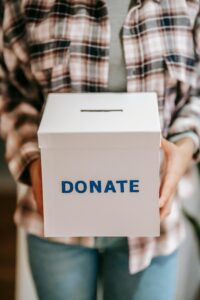Tagged: “forgiveness journey”
Calling Artificial Intelligence…….Calling AI. What Is Forgiveness?

Photo by Tara Winstead, Pexels.com
Yesterday, I asked AI about forgiveness and received this definition: “Forgiveness is the intentional decision to let go of resentment and anger toward someone who has harmed you, regardless of whether they deserve it.”
I then asked another form of rationality about this definition. That other form was my own studying of forgiveness for the past 40 years. Here is my response to the new intelligence that so many see as definitive:
1. Forgiveness is a decision. No, it is not. A decision is only one part of forgiveness. As an analogy, suppose you “make a decision” to work in a soup kitchen. There, you did it. However, suppose that you now spend most of your time on the couch as you eat corn chips and never actually go to the soup kitchen. Does your “decision” to work in the soup kitchen actually fulfill the goal? No, because you now have to act on this decision. This involves: a) thinking, such as planning; b) feeling, such as having sympathy toward those who do not have homes, which serves as an internal motivator to get up off the couch and put the chips away; and c) behavior as you go to the soup kitchen, get your assignment, and fulfill it.
2. Forgiveness is letting go of resentment. No again, it is not. If forgiveness only consists of letting go of resentment, then one might be able to do that by, for example, having disparaging thoughts about the offending person, such as, “This person is such a low-life that he just can’t help himself. I need to stay away from anyone like that!”
3. Forgiveness is letting go of “resentment and anger.” No again. Resentment encompasses anger in bigger doses over long periods of time. If one is going to use the terms “resentment and anger,” it is necessary to distinguish them. Short-term anger can be good as you see that no one should treat you unfairly. Resentment, as longer term anger, can turn on the one harboring it so that fatigue and even anxiety or depression might emerge.
4. The AI sentence shows reductionism. If AI were to expand what forgiveness is, it should include adding ideas such as “forgiveness is a moral virtue, or deliberately being good to those who are not good to you, more positive thoughts, feelings, and behaviors toward those who acted unfairly.” This would include working against the opposite of goodness, or struggling against negative thoughts that condemn, negative feelings that could include resentment, and negative behaviors which can include revenge toward those who offended.
AI does not have all the answers. Beware the easy way out when trying to understand what forgiveness is and is not. It is not excusing unjust behavior, automatically reconciling, or abandoning the quest for justice.
![]()
Heroic Forgiveness in Recent Church Shooting

Photo by Liza Summer, Pexels.com
On September 28, 2025, Thomas Jacob Sanford drove his pickup truck through the front doors of the meetinghouse of the Church of Jesus Christ of Latter-day Saints during a worship service in Grand Blanc Township, Michigan. He opened fire with an assault rifle and then set the structure ablaze. Four people were killed and eight were wounded. He was killed in the parking lot by police. In the aftermath, at least six online fundraisers were started for the assailant’s widow and children. David Butler of Utah started a fundraising campaign that saw thousands of people donating. The fundraising efforts were not without their critics, who said that the victims’ families should be the recipients of the gifts. Yet, the gifts were a gesture of forgiveness, shown directly to the offending person’s family.
How Do Forgiveness and Tolerance Differ?

Photo by Karola G, Pexels.com
Below is a Socratic dialogue between the mental health professional, Sophia, and her client, Inez. These are fictional characters. The conversation comes from the book, The Forgiving Life (APA Books, 2012).
Sophia: Are toleration and forgiveness the same?
Inez: They are very close to the same thing. When I forgive, I offer civility, respect, and even love toward the one who hurt me. I do not condemn, attack, or in any way harm the other. Toleration also deliberately avoids hurting the other person. So, they are synonyms.
Sophia: What do you think of this? To tolerate has two related meanings. First, it means to “put up with” another’s unpleasant behavior, as when a friend puts up with another’s unpleasant habit of always answering her mobile phone when the two of them are in deep conversation. Because the person with such a habit is not necessarily conscious of it, we can hardly say that all acts of toleration concern unjust behaviors on the part of the other person. Second, to tolerate means to recognize and respect the rights of others. Because a genuine right is never a wrong, such toleration cannot be forgiveness, which occurs in the context of others’ wrongs.
Inez: But, when I forgive, can’t we say that I am not harming the other? Because tolerance offers this as well, can’t we say that forgiveness shares something important with tolerance?
Sophia: Yes, we could say this, but what do you think? Does forgiveness share more with tolerance or more with moral love?
Inez: It shares something with each.
Sophia: But which one shares more with forgiveness?
Inez: I’d say that love has more in common with forgiveness because when we show goodness toward someone who has hurt us, this is a great good and much more than “putting up with” something or someone.
Sophia: Well said.
Inez: Thank you, Sophia. This is kind of fun. I think I am catching on to the depth of forgiveness.
Enright, Robert D.. The Forgiving Life: A Pathway to Overcoming Resentment and Creating a Legacy of Love (APA LifeTools Series) (Function). Kindle Edition.
![]()
Does a Lack of Reconciliation Interfere with Emotional Healing Upon Forgiving?

Photo by Rohit Singh, Pexels.com
A small scale qualitative study in India with 12 young adults showed that even when reconciliation is not possible, there are psychological benefits for those who forgive once a relationship breaks down. The study is here:
Sengupta, Poulami, Vidisha Rai, and Atasi Mohanty. Forgive and forego? Exploring interpersonal forgiveness in non-reconciled relationships among young adults. Psychological Studies 70.1 (2025): 46-60.
Erika Kirk forgives Tyler Robinson

Photo by RDNE Stock project, Pexels.com
In Erika Kirk’s speech at the memorial service for her husband, Charlie Kirk, she proclaimed toward the one accused of firing the shot, “I forgive him.” She received a standing ovation in front of approximately 70,000 people when she made this statement. Shortly after this, one of the members of our International Forgiveness Institute appeared on a radio program to discuss forgiveness and was asked if such quick forgiveness is legitimate. The answer was that it is rare, but does occur. One example given was that of Corrie Ten Boom, as described in her book, The Hiding Place. She was imprisoned in a concentration camp during World War II. While in a church and following one of her talks emphasizing the need for forgiveness, an SS officer who abused her while she was held captive approached her, extended his hand, and asked for forgiveness. She prayed and felt an electrical charge go up her arm, and was overwhelmed with a love for the man. She was able to legitimately forgive him. Such forgiveness, whether from Erika or Corrie, does not mean that anger never resurfaces again. It can. Yet, a pathway of forgiveness already has been experienced, and so practicing it again may lead to deeper forgiveness as the person continues to work on this important moral virtue.



